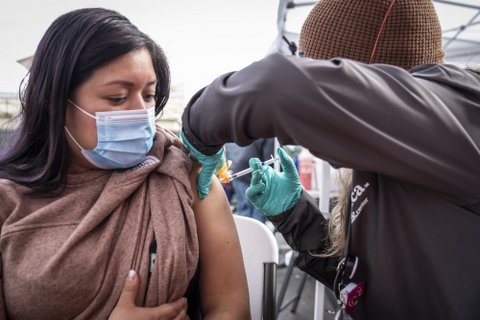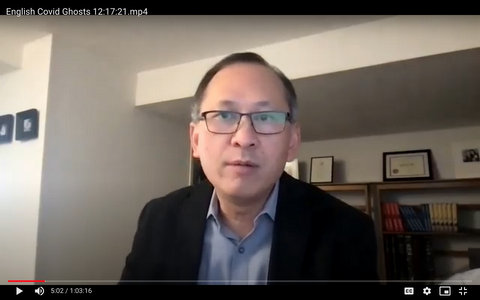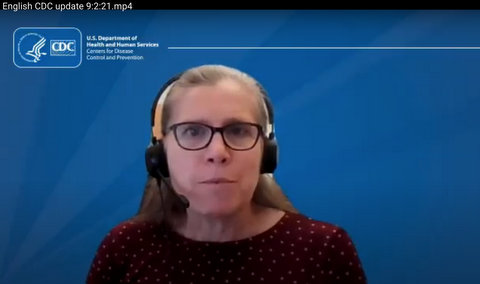
27 Oct Doctors Debate COVID-19 Booster Shots

Drs. Ben Neuman and Monica Gandhi shared sometimes conflicting perspectives during the Oct. 1 Ethnic Media Services teleconference “To Boost or Not to Boost: That Is the Question.” (Screenshots captured by Danielle Parenteau-Decker / The CC Pulse)
By Danielle Parenteau-Decker
Millions more Americans recently became eligible for COVID-19 booster shots, but should they get them when so many people around the world remain unvaccinated?
Drs. Monica Gandhi of UC San Francisco and Ben Neuman of Texas A&M shared sometimes opposing viewpoints on that question during a discussion hosted Oct. 1 by Ethnic Media Services.
“Public health experts are divided about who should get the third shot and when,” EMS director Sandy Close said, summing up the debate.
The U.S. Food and Drug Administration said Oct. 20 that certain recipients of the Moderna and Johnson & Johnson vaccines could receive booster shots. Certain Pfizer recipients were already eligible. To be able to get a Pfizer or Moderna booster, a person must be 65 or older or 18-64 and immunocompromised or “with frequent institutional or occupational exposure to” the coronavirus, according to a press release. They also must have received their initial doses at least six months prior. Anyone 18 and older who got the J&J vaccine can get a booster shot if it has been at least two months since their first shot.
In the U.S., as of Oct. 26, nearly 191 million people, or 57.5% of the population, are considered fully vaccinated. But globally, that figure drops to 38%. Roughly half of all people in the world have received at least one dose of a COVID-19 vaccine. Although that represents a large number of people, distribution is far from equitable.
Roughly 2.2% of those doses have gone to low-income countries, while wealthy countries such as the U.S. have enough for the equivalent of five doses per person, according to Gandhi.
“We call that hoarding,” she said.
Gandhi stressed the importance of considering that context when thinking about booster shots.
“I have a really hard time distinguishing the booster discussion from the global vaccine equity discussion,” she said. “I think it is truly impossible to separate it.”
She advocated for a selective approach in which those at the greatest risk in the U.S. could get boosters. But she also put the larger issue in stark perspective.
“We want to prevent Americans from getting a cold, but we let vulnerable [people] and health care workers die in the rest of the world,” Gandhi said.
Neuman, on the other hand, argued while “the social justice issue is real,” the U.S. needs to do everything it can to stop the coronavirus at home first.
“It is hard for me, as a virologist, to understand the FDA’s decision to recommend boosters only for a certain age group and not for everyone,” he said.
He said data released last month by the FDA made him think, “no one is fully vaccinated.” Neuman added that is because the term “fully vaccinated” is being used incorrectly as medical experts don’t actually know yet what that would look like when it comes to COVID-19.
He’s not alone in his thinking. Rochelle Walensky, the director of the Centers for Disease Control and Prevention, said Oct. 22 that the agency “may need to update our definition.”
“We need to get somewhere fully vaccinated, and if not here, then where? And if not now, then when?” Neuman said. “The logistics are in place to make it at least possible here.”
He likened fighting the virus to fighting a fire: “Put it out completely in one area and then widen the ring of protection until it covers everyone.”
The push for booster shots stems from reports of waning antibodies from the vaccine. But Gandhi said this is not cause for concern.
In explaining how the immune system and vaccines typically work, Gandhi said that the loss of antibodies is normal — and even necessary. It doesn’t mean the body is less protected because the vaccine generates “memory B cells that are a blueprint to make more” antibodies, if needed, she said.
“We know the vaccines produce strong T-cell immunity,” she added.
The mRNA vaccines, like those made by Pfizer and Moderna, provide “really strong, enduring protection” against the coronavirus and its variants, Gandhi said.
Despite their different approaches, Gandhi and Neuman did agree on the importance of taking a global perspective.
“We are not safe from variants until other people are safe,” Gandhi said.
“COVID isn’t over until it is over everywhere,” Neuman said. “If we do not stop this everywhere, it will eventually come back in some form.”
Whether you need a booster or your first shot, COVID-19 vaccines are available for free from your healthcare provider, government-run clinics and local pharmacies. For more information, visit Contra Costa Health Services’ Get Vaccinated page.






No Comments